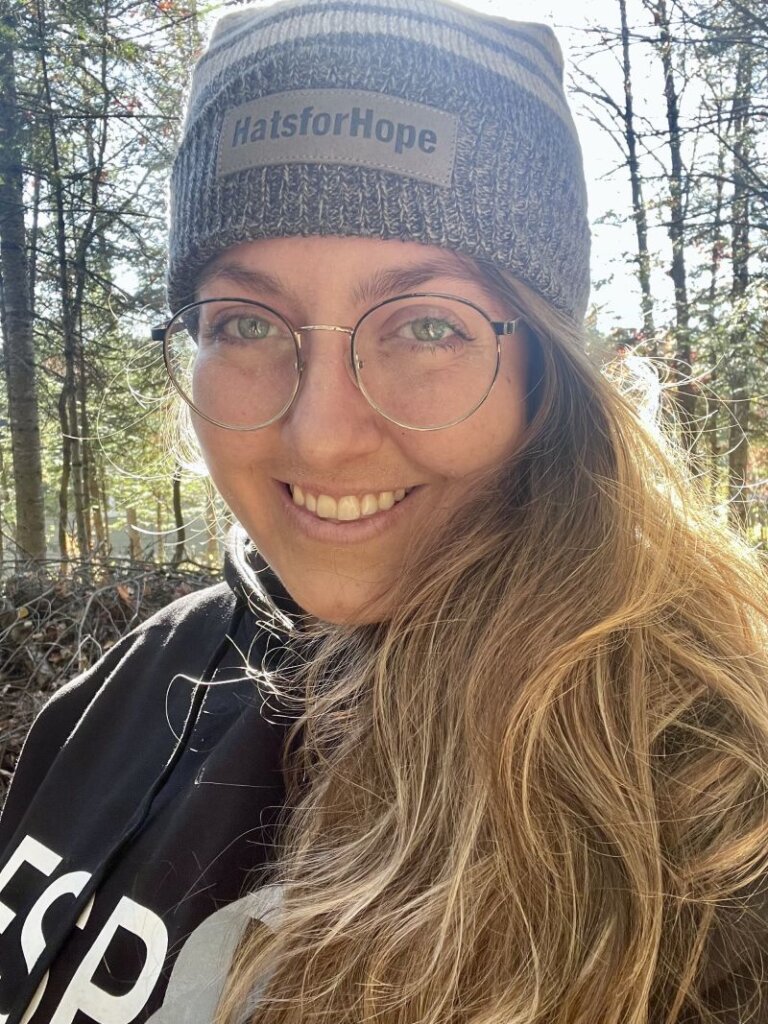
Health-Care Professional Award – Marilyn Durivage
What inspired you to start volunteering?
In 2022, my partner was diagnosed with a brain tumour, a grade 2 oligodendroglioma, at the age of 38. After a seizure seemingly out of the blue at home, which our dog alerted me to with his barking, an unexpected chapter began for both of us.
My partner was taken care of by the incredible team at the Centre hospitalier de l’Université de Montréal (CHUM). He underwent an awake craniotomy that allowed for the near-total resection of the tumour and is now being followed by a fantastic neuro-oncologist who gives us hope and provides close and reassuring care. He is fortunate to be on a new treatment for gliomas, and his cancer has been under control for over a year now—something we are deeply grateful for.
During that first year, we lived day by day, and it was incredibly difficult. Fear. Doubt. Anticipation. Grief. So many potential losses haunted me—the fear that our life would never be the same, that I might lose him, that we might not grow old together.
My partner returned to work shortly after his surgery, and I did the same. Life goes on, or at least, we try to pretend it does. I work as a family physician in both inpatient care and rehabilitation. While I deal with cancer in my professional life every day, seeing patients pick up the fight or lay down their arms, experiencing it from the other side of the hospital bed is completely different. You lose control. You’re carried along by the specialists, the healthcare teams, and all you can do is wait—for test results, for appointments, for MRIs, for blood work, for a phone call. You feel powerless.
I stumbled upon Brain Tumour Foundation of Canada’s Facebook page by chance, looking for others who might be living through the same nightmare—trying to make sense of the senseless.
I was struck by the number of fundraising events, the helpful resources on the site and the wide variety of support offered to both survivors and caregivers. I quickly felt the desire to get involved, to try and bring something meaningful, something kind and beautiful, out of something that is anything but.
Volunteers often “wear many hats.” What hats have you worn as a volunteer and can you share how and when you got involved?
In the summer of 2023, I came across a post saying BTFC was looking for a facilitator for the francophone support group. I felt an urgent need to take action—to break the cycle of helpless waiting that had paralyzed me since the diagnosis. I first joined the group as a participant, and I was lucky to be welcomed by Laurie and to meet Anaïs—two amazing and essential people in the support group.
I’ve had the privilege of facilitating the group for the past two years. We’ve met truly unique, resilient, strong, inspiring and unforgettable individuals. Sadly, we’ve also had to say goodbye, with heavy hearts, to some members who reached the end of their unfair battle. We honour their memory at every meeting.
Every story shared is unique, difficult and still beautiful in its own way. These moments help us grow, share hope, and remind each other that we’re not alone in this unnameable moment.
Looking ahead to June 2026, I’m aiming to organize a Brain Tumour Walk in my region—the Laurentians, in Quebec—to support research and bring people together around a cause that is very close to my heart.
What is your fondest memory of volunteering?
It’s hard to pinpoint just one moment, as each support group meeting is unique and meaningful. Whether we’re simply checking in on each other or welcoming a new member who doesn’t know what to expect when they join, we always seem to leave feeling a little lighter.
There’s always a smile, a phrase or a moment that resonates, and for some, it plants a small seed of hope that is so badly needed.
With Brain Cancer Awareness Day and Hats for Hope in mind, what message of hope would you share with others in the brain tumour community?
That cancer doesn’t mean the end of everything.
It’s undoubtedly a different chapter, but it can still contain beautiful moments. It’s a chapter that teaches us to slow down, to celebrate the little victories or everyday moments we once overlooked, to take our time, to focus on what matters most and let go of what doesn’t.
It definitely is not the final chapter.
There is more to come—a future we have the right to imagine thanks to research that continues to move forward every day. Progress in medicine—in treatments, in survival rates, and in quality of life—means that more and more people are not just living, but truly living, with brain tumours.